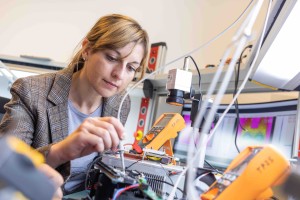The harvesting and processing of chestnuts is a laborious process. Students from the Sustainable Food Management course at FH JOANNEUM addressed this problem and developed a prototype for a chestnut sorting machine.
We love chestnuts, in autumn with young wine at a local wine tavern or with punch at the Christmas markets. The regional harvesting and processing of the chestnuts is hard work. The various stages of processing are largely carried out manually and some are physically demanding. Add to this that the whole harvest has to be processed in a short period of time. “There must be an easier way,” students on the Sustainable Food Management course at FH JOANNEUM thought.
A comprehensive analysis was carried out as part of a vocational internship with Austria’s largest chestnut processing company. The various stages of work were investigated in addition to detailed process, material and energy flow analyses. Students set about recording the data and processes with enthusiasm and identified significant potential for optimisation: an automated sorting machine which would reliably take over some of the hard physical labour.
Students and experts from various disciplines worked in project groups at FH JOANNEUM to come up with ideas for optimisation. Various engineering issues had to be solved and the interdisciplinary expertise in the project groups was used to devise promising concepts.
The chestnut processing company and project partner was immediately impressed. A joint project was launched and students from the Institute of Applied Production Sciences built a prototype sorting machine with the support of teaching staff. The first practical test was met with great enthusiasm by all concerned – and was a success thanks to the extensive preparatory work undertaken.
The project is now underway and the prototype is being developed into a regular chestnut sorting machine which will be integrated into the overall process. “Applied interdisciplinary projects are very valuable for our students as well as for the partner companies and us as lecturers and researchers. Everyone involved can learn a great deal from one another,” says Simon Berner, who works for FH JOANNEUM and heads the project. “I am always impressed when the machine is complete and the process works as planned and you helped to design it from the outset,” says student Franz Auer who played a significant role in the project from the start.









